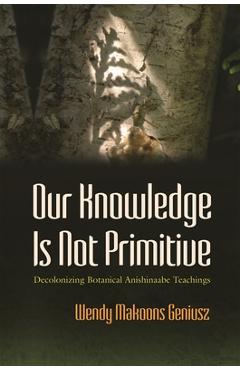Our Knowledge Is Not Primitive: Decolonizing Botanical Anishinaabe Teachings - Wendy Makoons Geniusz

Detalii Our Knowledge Is Not Primitive:
libris.ro
166.99 Lei
185.54 Lei
Social Science
Wendy Makoons Geniusz
Our Knowledge Is Not Primitive: - Disponibil la libris.ro
Pe YEO găsești Our Knowledge Is Not Primitive: de la Wendy Makoons Geniusz, în categoria Social Science.
Indiferent de nevoile tale, Our Knowledge Is Not Primitive: Decolonizing Botanical Anishinaabe Teachings - Wendy Makoons Geniusz din categoria Social Science îți poate aduce un echilibru perfect între calitate și preț, cu avantaje practice și moderne.
Preț: 166.99 Lei
Caracteristicile produsului Our Knowledge Is Not Primitive:
- Brand: Wendy Makoons Geniusz
- Categoria: Social Science
- Magazin: libris.ro
- Ultima actualizare: 28-10-2025 01:22:05
Comandă Our Knowledge Is Not Primitive: Online, Simplu și Rapid
Prin intermediul platformei YEO, poți comanda Our Knowledge Is Not Primitive: de la libris.ro rapid și în siguranță. Bucură-te de o experiență de cumpărături online optimizată și descoperă cele mai bune oferte actualizate constant.
Descriere magazin:
Traditional Anishinaabe (Ojibwe or Chippewa) knowledge, like the knowledge systems of indigenous peoples around the world, has long been collected and presented by researchers who were not a part of the culture they observed. The result is a colonized version of the knowledge, one that is distorted and trivialized by an ill-suited Eurocentric paradigm of scientific investigation and classification. In Our Knowledge Is Not Primitive, Wendy Makoons Geniusz contrasts the way in which Anishinaabe botanical knowledge is presented in the academic record with how it is preserved in Anishinaabe culture. In doing so she seeks to open a dialogue between the two communities to discuss methods for decolonizing existing texts and to develop innovative approaches for conducting more culturally meaningful research in the future. As an Anishinaabe who grew up in a household practicing traditional medicine and who went on to become a scholar of American Indian studies and the Ojibwe language, Geniusz possesses the authority of someone with a foot firmly planted in each world. Her unique ability to navigate both indigenous and scientific perspectives makes this book an invaluable contribution to the field of Native American studies and enriches our understanding of the Anishinaabe and other native communities.

Produse asemănătoare

Our Knowledge Is Not Primitive: Decolonizing Botanical Anishinaabe Teachings - Wendy Makoons Geniusz
![]() libris.ro
libris.ro
Actualizat in 28/10/2025
166.99 Lei
Produse marca Wendy Makoons Geniusz

Our Knowledge Is Not Primitive: Decolonizing Botanical Anishinaabe Teachings - Wendy Makoons Geniusz
![]() libris.ro
libris.ro
Actualizat in 28/10/2025
166.99 Lei